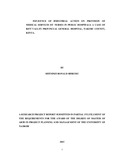| dc.description.abstract | medical services, to investigate the influence of walk out strikes on the provision of medical
services, to identify the influence of go slow strikes on the provision of medical services and to
establish the influence of picketing on the provision of medical services. The theoretical
framework of this study was derived from conflict and functional theories. The study used an ex
post facto design. The population of the study was 540 nurses from the hospital and a sample of
225 nurses were selected using simple random sampling. A structured questionnaire was used to
collect data. Data analysis was done using Statistical Package for Social Sciences (SPSS) version
19. Descriptive statistics was computed and data was presented using tables. The findings
indicated that most (89%) of the respondents noted that the number of outpatients in the hospital
drop. The study also revealed that walkout strikes may cause the risk of hospitals being closed
down; this was supported by 89% of the respondents, majority (87%) of the respondents also
agreed that, during this period, the management is put under pressure thus unable to effectively
manage and the whole process disrupts general work operations in the hospital and finally the
findings indicated that most (73%) of the respondents strongly agreed that picketing disrupts
daily hospital routine. It was concluded that strike activity clearly affected to a large extend the
provision of medical services in the industry. Participants reported that sit in strikes, walk out
strikes, go slow strikes and picketing gives employees the opportunity to occupy the work place,
continue or perhaps stop work but deny the employer access to or control of the production
process. The employees remain on the employer's premises, taking possession of the property
and preventing the employer from entering is per se unlawful. This affects the running of the
hospital activities. The study recommended that workers should be well paid so that they can
meet up with their daily needs and it should not be delayed for any reason at all and that the
government should stop using threats to the employee as a solution to strike action rather they
should use dialogue to bring a lasting solution. | en_US |

